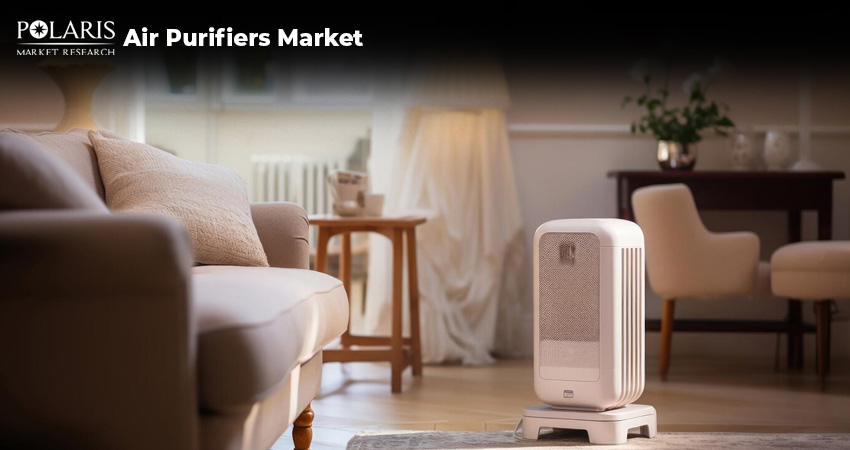Benchmarking Performance: Top 5 Companies in Air Purifiers

In what location do you spend the majority of your day? Is it at work or home? Or perhaps your job requires you to travel frequently, making you one of the third group of people who do so? The first two groups, which include spending the most time indoors, probably include the majority of us. People frequently acknowledge the declining quality of the air when they are outside. However, did you know that the air quality indoors, whether at home or work, is significantly worse than that outside?
Inhaling indoor air can also lead to allergies, respiratory issues, and other related diseases because it is prone to various dust particles, germs, and other micro-sized particles. In response, air purifiers have emerged as critical devices for maintaining cleaner and healthier indoor air. This blog discusses the importance of air purifiers, their working mechanisms, types, and notable companies driving innovation in this market.
Why Use Air Purifiers?
Air pollution is a silent killer, contributing to a wide range of health issues, including asthma, bronchitis, cardiovascular disease, and even cancer. According to the US Environmental Protection Agency (EPA), indoor air can be 2-5 times more polluted than outdoor air due to contaminants such as dust, pollen, pet dander, mold spores, volatile organic compounds (VOCs), and bacteria.
Air purifiers reduce these risks by removing contaminants from the air, resulting in a safer breathing environment. They are especially beneficial for people with respiratory issues, allergies, or weakened immune systems and are increasingly regarded as essential for overall health.
Top Companies Manufacturing Air Purifiers
- Dyson
Dyson Limited is a multinational technology company with Singaporean and British roots. It was established in Malmesbury, England, in 1991. In order to be nearer to its Asian customer base and manufacturing and supply-chain hubs, Dyson relocated its headquarters from the UK to Singapore in 2019. Dyson is well-known for its sleek, advanced designs. Its air purifiers, including the Dyson Pure Cool, feature HEPA and activated carbon filters. Dyson's devices frequently function as fans or heaters, providing year-round utility.
Honeywell, a market leader in home and industrial solutions, has been producing air filters and purifiers for over 75 years. The Honeywell Heating Specialty Company was founded in Wabash, Indiana, in 1906. Its headquarters are in Charlotte, North Carolina. Honeywell provides a variety of air purifiers to meet various needs. Its products are well-known for their long-lasting quality, low cost, and efficient filtration.
- Coway
Coway was founded in 1989 and is headquartered in Seoul, South Korea. Coway's R&D Center is a member of the International Environmental Safety Certification Center. Coway combines sleek design with powerful filtration systems. Its Airmega series is well-known for its smart features, which include real-time air quality monitoring and energy-saving modes.
- IQAir
IQAir was established in 1963 in Germany. The company's headquarters are in Steinach, Switzerland, on the shores of Lake Constance. IQAir is synonymous with high-performance air purification, serving both residential and commercial customers. The HealthPro series, which includes HyperHEPA filtration, captures ultrafine particles smaller than 0.003 microns, resulting in unparalleled air quality.
Koninklijke Philips N.V., or Philips, was founded in Eindhoven, the Netherlands, in 1891. The company's headquarters have been in Amsterdam since 1997, but its Benelux headquarters remain in Eindhoven, Netherlands. Its air purifiers are praised for their low cost, compact design, and effective HEPA filtration. They are especially popular with budget-conscious buyers looking for dependable air-cleaning solutions.
How do Air Purifiers Work?
Air purifiers use a variety of technologies to filter or neutralize airborne pollutants. These include:
- High-Efficiency Particulate Air (HEPA) Filters
HEPA filters can capture particles as small as 0.3 microns at 99.97% efficiency. They are especially effective at eliminating dust, pollen, and pet dander from the area.
- Activated Carbon Filters
These filters specialize in trapping odors and gases, such as VOCs and smoke. They are frequently used in conjunction with HEPA filters for complete air purification.
- Ultraviolet (UV) Light
UV purifiers use ultraviolet light to kill bacteria, viruses, and other microorganisms, making the air sterile.
- Ionizers
Ionizers emit negatively charged ions that bond with airborne particles, causing them to settle out of the air.
- Ozone Generators
These devices produce ozone to neutralize odors and kill bacteria, but they are often avoided due to potential health risks.
Latest Trends in Air Purifiers
The air purifiers market is rapidly evolving, owing to technological advancements and growing awareness of air quality issues. Some major trends include:
- Smart Connectivity
With the rising popularity of IoT technology among consumers, manufacturers are focusing on creating air purifiers that are capable of monitoring and controlling them through integration with IoT devices and mobile apps.
- Eco-Friendly Designs
Companies influencing the market nowadays are concentrating on sustainable materials and energy-efficient models to lessen their impact on the environment.
- Compact and Portable Models
With the rising urbanization, the living spaces in urban areas are getting smaller and smaller. Thus, the demand for portable and space-saving air purifiers is on the rise.
- Focus on Specific Pollutants
Due to the latest enhancements in technological aspects, air purifier manufacturers are focusing on developing targeted solutions for issues like wildfire smoke, VOCs, and allergens.
Conclusion
Air purifiers are no longer a luxury but rather a necessity in today's polluted world. Individuals and businesses can improve indoor air quality and protect their health by purchasing the right air purifier. With companies like Dyson, IQAir, and Honeywell at the forefront, the air purifier market promises a cleaner, healthier future for everyone.

